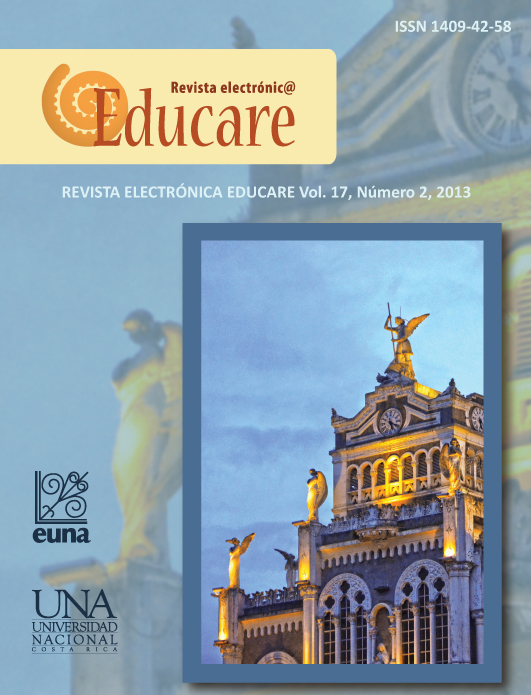Mental Health Counseling: Thoughts on Defining a Professional Intervention field
DOI:
https://doi.org/10.15359/ree.17-2.3Keywords:
Counseling, health, ecological theory, intervention, mental health promotion, strengths, Costa Rica, Educare e-JournalAbstract
The purpose of this paper is to provide some thoughts on a series of points of view that will help us in defining mental health as an intervention field of counseling. Reference is made to the epistemological positioning adopted to understand health, which is focused on a contextual perspective. A health promotion model is proposed to support the counseling activity. The reasons for limiting the intervention to mental health promotion, which are related to theoretical and methodological references inherent to the discipline, are also explained. Recommendations are made on the aspects to be considered for both individual and collective approaches and for extending the professional practice of counselors with an efficient performance as mental health promoters.
References
Adame, M. T., Álvarez, M. y Bisquerra, R. (2001). Principios, objetivos y funciones de la orientación.
En R. Bisquerra (Coord.). Modelos de orientación e intervención psicopedagógica (pp. 41-54).
España: Ciss Praxis.
Bonilla, F. S. (marzo, 1993). Orientación de poblaciones abusadas. Revista de Ciencias Sociales
Universidad de Costa Rica, 59, 53-62.
Carmona, L. D., Rozo, C. M. y Mogollón, A. S. (enero-junio, 2005). La salud y la promoción de
la salud: Una aproximación a su desarrollo histórico y social. Revista Ciencias de la Salud,
(1), 62-77.
Flórez, L. (2007). Psicología social de la salud. Promoción y prevención. Colombia: Editorial El
Manual Moderno.
Gavilán, M. G. (2006). La formación de orientadores en contextos complejos con especial
referencia a Latinoamérica. En Z. R. Vargas (s. f.). Antología del curso Orientación para la
vida adulta. Maestría Profesional en Orientación, San José, Costa Rica: Universidad de
Costa Rica.
González, M. y García, M. (1994). Psicología de la salud y educación para la salud. El
contexto escolar como marco en prevención y educación para la salud. Revista Aula,
, 127-142.
Gordillo, M. V. (1988). Manual de orientación educativa. España: Editorial Grupo Anaya Comercial.
López, S. y Escudero, V. (2003). Familia, evaluación e intervención. España: Editorial CCS.
Marks, D. F., Murray, M. y Evans, B. (2008). Psicología de la salud: Teoría, investigación y práctica.
México: Manual Moderno.
Morago, P. (2006). Tratamiento comunitario asertivo: Prácticas, consideraciones éticas y rol del
trabajador social. Cuadernos de Trabajo Social, 19, 7-23.
Oblitas, L. A. (2006). Psicología de la salud y calidad de vida. México: Thomson Learning
Organización Mundial de la Salud (OMS). (2004). Promoción de la salud mental: conceptos,
evidencia emergente, práctica. Recuperado de http://www.who.int/mental_health/
evidence/promocion_de_la_salud_mental.pdf
Organización Panamericana de la Salud (OPS). (1996). Promoción de la salud: Una antología.
Estados Unidos.
Papalia, D. E., Wendkos, S. y Duskin, R. (2001). Desarrollo humano. Bogotá: McGraw-Hill
Tobón O. (enero-diciembre, 2003). El autocuidado una habilidad para vivir. Revista Hacia la
Promoción de la Salud, 8, 1-12. Recuperado de http://promocionsalud.ucaldas.edu.co/
downloads/Revista 8_5.pdf
Torrico, E., Santín, C., Andrés, M., Menéndez, S. y López, M. J. (junio, 2002). El modelo ecológico
de Bronfenbrenner como marco teórico de la psicooncología. Anales de Psicología, 18(1),
-59.s Recuperado de http://www.redalyc.org/articulo.oa?id=16718103
Downloads
Published
How to Cite
Issue
Section
License
1. In case the submitted paper is accepted for publication, the author(s) FREELY, COSTLESS, EXCLUSIVELY AND FOR AN INDEFINITE TERM transfer copyrights and patrimonial rights to Universidad Nacional (UNA, Costa Rica). For more details check the Originality Statement and Copyright Transfer Agreement
2. REUTILIZATION RIGHTS: UNA authorizes authors to use, for any purpose (among them selfarchiving or autoarchiving) and to publish in the Internet in any electronic site, the paper´'s final version, both approved and published (post print), as long as it is done with a non commercial purpose, does not generate derivates without previous consentment and recognizes both publisher's name and authorship.
3. The submission and possible publication of the paper in the Educare Electronic Journal is ruled by the Journal’s editorial policies, the institutional rules of Universidad Nacional and the laws of the Republic of Costa Rica. Additionally, any possible difference of opinion or future dispute shall be settled in accordance with the mechanisms of Alternative Dispute Resolution and the Costa Rican Jurisdiction.
4. In all cases, it is understood that the opinions issued are those of the authors and do not necessarily reflect the position and opinion of Educare, CIDE or Universidad Nacional, Costa Rica. It is also understood that, in the exercise of academic freedom, the authors have carried out a rogorous scientific-academic process of research, reflection and argumentation thar lays within the thematic scope of interest of the Journal.
5. The papers published by Educare Electronic Journal use a Creative Commons License:














 The articles published by Educare Electronic Journal can be shared with a Creative Commons License:
The articles published by Educare Electronic Journal can be shared with a Creative Commons License: 



